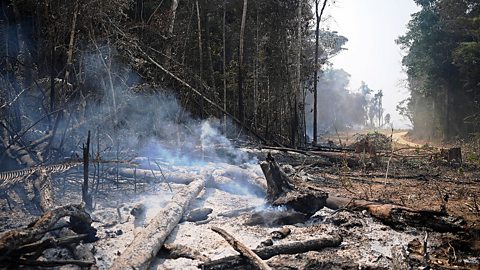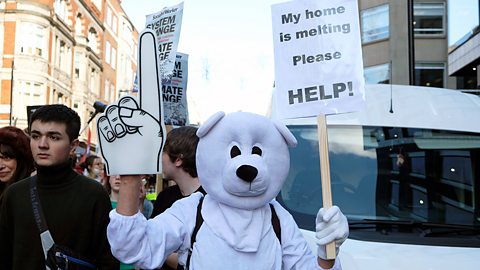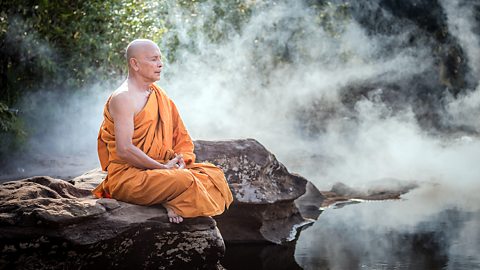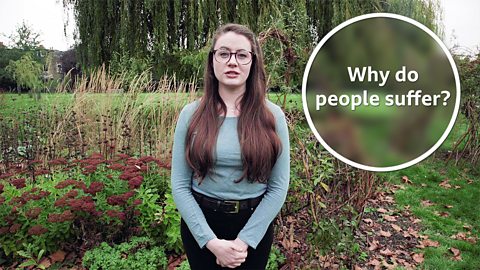Most people, whether they are religious or not, will agree that the planet is special and deserving of our care and respect. Many religious people would go even further and say that the world is sacred, or holy, as it has been created by a God or a divine power, and that humans are responsible for ensuring it is looked after for future generations.
Explore the issues
Watch Jamarl as he examines religious and non-religious teachings about Earth and the environment.
Is the Earth sacred? Or to put it another way, is it holy? Is it special? Is it worth our respect? And if it is, and even if it isn't, who's responsible for looking after it?
Most religions believe that the Earth is sacred because God created it. Jews, Christians and Muslims generally believe that God made the world for humans to live in. But it still belongs to God.
Humans were given the job of being stewards or khalifahs, as Muslims say, which means people who look after someone else's property. So, humans have the responsibility for the Earth and Muslims especially believe they'll be judged by God on how well they've done the job.
Sikhs generally believe that God created the world and gives life to everything, and all life is a part of God. So if anyone does anything to harm the Earth, they're actually harming themselves.
Hindus say there are rivers, mountains and forests that are especially holy and some are worshipped as gods and goddesses. And many Hindus follow the principle of ahimsa, which means non-violence so they should try their best to do no harm to any living thing or to the Earth.
The Buddha didn't teach that there is a god, so Buddhists generally believe that responsibility for the world is completely in our hands. They also follow the principle of ahimsa, as well as the principle of karuna which means compassion for all living things on Earth.
Many scientists say they can explain how the Earth was formed without any need for a god. They say everything began with the Big Bang when the universe exploded outwards from a single tiny point. So if God didn't create the world, then is it sacred and do we need to look after it? Well, yes. A theory like the Big Bang can also make our planet sacred because as far as we know, the Earth is the only place where life exists. And if atheists are correct and there is no life after death, then surely humans have even more of a reason to make life on Earth better for everyone.
Is the Earth sacred? Lots of religious and non-religious people say that it is, but for different reasons. We all share responsibility for our planet's future. But are we taking it seriously enough? And what are you going to do about it?
The future of our planet
Many people ‚Äď both religious and non-religious ‚Äď are growing increasingly concerned about the future of our planet. Modern lifestyles and growing human populations present a number of threats to the environment as people consume more and more of the Earth‚Äôs resources. Average temperatures have increased by nearly one degree Celsius in the last 100 years, and the polar ice caps are melting. Most scientists agree that the most likely cause of climate change is human activity. The Intergovernmental Panel on Climate Change estimates that global warming is likely to reach 1.5¬įC between 2030 and 2052 if it continues to increase at the current rate.

Human activity
Pollution caused by human activity is another big problem for the planet. For example, pesticides are strong chemicals used to kill insects and other small animals that damage crops, but these chemicals seep into rivers and lakes where they kill fish. Humans also destroy the natural habitats of many different animals to build on, or to make way for farmland. Some animals cannot cope with sudden, major changes to their natural habitat, and may die out as a result. In the last fifty years, human beings have destroyed half of all forest and woodland for timber, construction and fuel, or for more space to grow crops. This is called deforestation. Most species, including humans, need the oxygen from trees to survive, and the increase in carbon dioxide resulting from deforestation has contributed to the greenhouse effect.

Words of wisdom
What do belief systems and religions say about the environment and the natural world? Click the picture below to explore wisdom and teachings.
Ahimsa and sewa
Hindus believe that the supreme being, Brahman, created the world, which of course makes it sacred. They also believe that Brahman is present in everything, so doing harm to the world is doing harm to Brahman as well. This means people must care for the world and take responsibility for its future. In Hinduism, there is the principle of ahimsa which means non-harm to other living creatures. For this reason, many Hindus are vegetarian or vegan, which many people acknowledge has less of an impact on the environment than raising animals and killing them to eat meat. Many Sikhs also believe that God (whom they call Waheguru) created the world and is present in it, and this also motivates them to care for the planet. Sikhs believe that caring for the planet and doing their best to avoid damaging it is an important part of the duty of sewa, meaning service, by which they live their lives.

Stewards of the Earth
Christians, Jews and Muslims believe that God made human beings stewards of the Earth, in charge of caring for the created world. This means that while the world belongs to God, people have been entrusted to look after it on his behalf.
Christians and Jews believe that God instructed Adam and Eve to be his stewards, a story told in the Book of Genesis. God also gave them dominion, which means that they have authority over the other creatures God created. Most Christians and Jews believe that this means humans have a huge responsibility, and it does not mean that God gives humans the right to treat the planet however they would like.
The Qur‚Äôan also tells Muslims that they have the duty of guardianship, which is known as ‚Äėkhalifah‚Äô. Muslims believe that they will be held accountable for their actions affecting the planet on the Day of Judgement.

Environmental activism
Many non-religious people (and religious people too) are deeply concerned for the future of the planet. There are lots of examples of non-religious people who are environmental activists. These activists strive to take personal responsibility for the environment, as well as encouraging others to do so. Atheists do not believe the world was created by a god and do not believe that the world is sacred. They take action to ensure the future of the planet, not to honour a higher being, nor to follow any sort of commandment or avoid punishment in a next life, but because they see a situation which people need to respond to.
Earth and the environment in pictures

Image caption, Buddhism ‚Äď A Buddhist monk meditating outdoors
The natural world is regarded by many Buddhists as a source of inspiration. Some types of Buddhism emphasise the belief that everything is interconnected and encourage people to view humanity as part of nature, and not separate from it. In what ways do you feel that human beings are connected to, or separate from the natural world around them?
1 of 7
Play Bitesize secondary games. game
Have fun playing science, maths, history, geography and language games.

More on Morals, ethics and philosophy
Find out more by working through a topic
- count3 of 8
